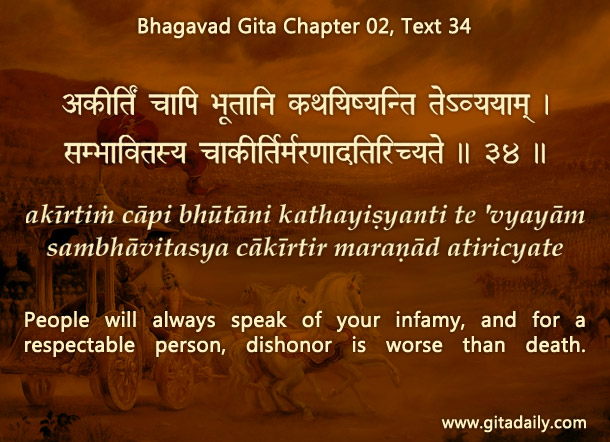From honor-culture to honorable action – The Bhagavad-gita’s call for honorable action (02.34) reflects a characteristic of most traditional cultures: a concern for honor. People were trained to value their ‘word of honor’ as much as their life, if not more. Those with a sense of honor were considered trustworthy.
While everyone was expected to have a sense of honor, it was especially important for powerful individuals like those belonging to nobility. Such people often had a lot of power for which they might not be held accountable easily or immediately — what deterred them from abuse of power was their sense of honor and the concomitant fear of being dishonored.
The regulatory role of honor is seen even today. When a head of state assumes power, they often take a public oath of office. People who officially join a spiritual tradition are told to take initiation vows.
In bridging the gap from honor to honorable action, two caveats are important. Words of honor have value only when people have a sense of honor; otherwise, they are just lip service or even cover-ups for hypocrisy. And those with a sense of honor need a sound inner compass — it helps them evaluate whether what they consider the honorable course of action is actually the right action in particular real-life situations. Otherwise, their sense of honor may end up rationalizing irrational inflexibility, which may degenerate to macabre specters such as honor killings.
The Gita explains that we all are parts of divinity — such spiritual self-understanding naturally infuses us with a sense of honor. And the Gita provides a sophisticated philosophy that rejects religious ritualism for spiritual growth (18.66) — such intellectual insight can align our inner compass with life’s ultimate purpose, beyond stereotyped conceptions of honorable actions.
One-sentence summary:
To act honorably, we need a sense of honor and an inner compass to discern the honorable course of action.
Think it over:
- How can the regulatory role of honor be seen today?
- In bridging the gap from honor to honorable action, what caveats need to be considered?
- How are these caveats addressed by Gita wisdom?
***
02.34: People will always speak of your infamy, and for a respectable person, dishonor is worse than death.
To know more about this verse, please click on the image


Leave A Comment